Daily Vocabulary Words: List of Daily Used Words in Leading Indian Newspapers
Hi there. Welcome to this special section @ Wordpandit. Our endeavour here is straightforward: highlighting daily vocabulary words that you would come across in leading newspapers in the country. We have included the following newspapers in our selection:
• The Times of India
• The Economic Times
• Hindustan Times
• Mint
• Indian Express
We are putting in extensive work to develop your vocabulary. All you have to do is be regular with this section and check out this post daily. This is your repository of commonly used words; essentially, we are posting a list of daily used words. Hence, this has significant practical application as it teaches you words that are commonly used in leading publications mentioned above.
Visit the website daily to learn words from leading Indian newspapers.
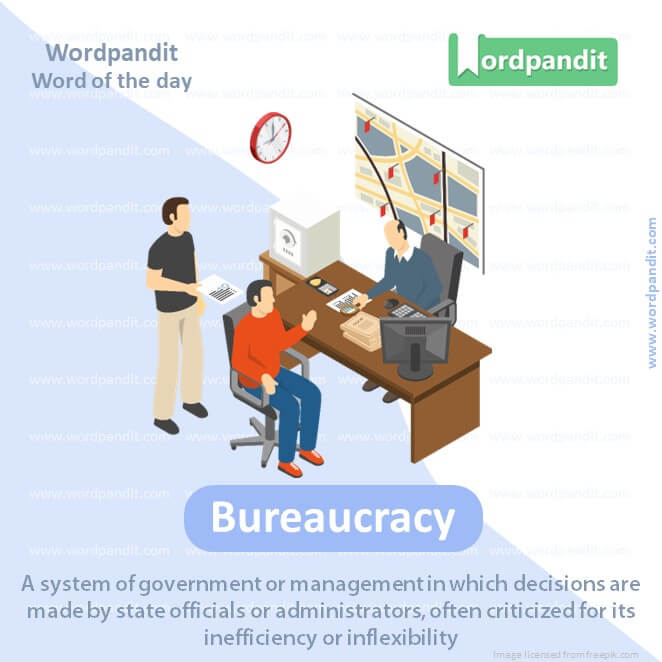
WORD-1: BUREAUCRACY
CONTEXT: The administration’s failure to handle the crisis efficiently has been blamed on deep-seated bureaucracy and red-tapism prevalent in governmental systems.
SOURCE: The Times of India
EXPLANATORY PARAGRAPH: Imagine you want to play a game with your friends but you need to ask a lot of people for permission first, and they have a slow, strict way of deciding things. We call this kind of slow and strict system with many rules a bureaucracy.
MEANING: A system ofgovernment or management in which decisions are made by state officials or administrators, often criticized for its inefficiency or inflexibility (Noun).
PRONUNCIATION: byoo-ruh-kruh-see
SYNONYMS: administration, civil service, officialdom, red tape, government
USAGE EXAMPLE:
a) The bureaucracy in our school is frustrating, it takes forever to get anything done.
b) In many bureaucracies, paperwork must be filled out in duplicate.
c) The bureaucracy of the government is slow and inefficient.
d) The citizens often complained about the unnecessary bureaucracy involved in getting government aid.
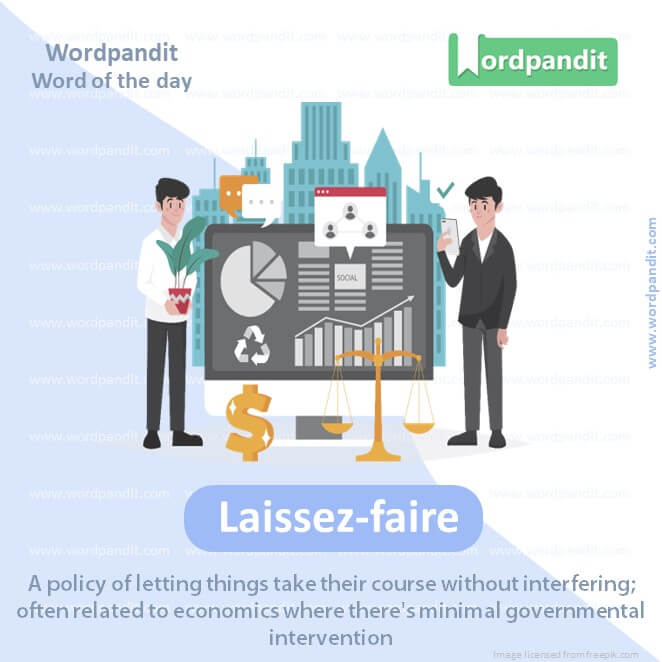
WORD-2: LAISSEZ-FAIRE
CONTEXT: The emerging startups in India have been arguing for more ‘laissez-faire’ policies, stating that less government interference in the economic sector would spur growth and innovation.
SOURCE: The Economic Times
EXPLANATORY PARAGRAPH: “Laissez-faire” is like when your parents let you and your friends play unsupervised, without interfering in how you play.
MEANING: A policy of letting things take their course without interfering; often related to economics where there’s minimal governmental intervention (Noun).
PRONUNCIATION: les-ey fair
SYNONYMS: nonintervention, free enterprise, free-trade, deregulation, noninterference
USAGE EXAMPLE:
a) In economics, the term “laissez-faire” is often used to describe a hands-off approach.
b) Some parents have a laissez-faire attitude towards disciplining their children.
c) The company’s laissez-faire policy to office decor means we can style our desks as we wish.
d) The teacher’s laissez-faire approach allowed the students to learn in a free environment.
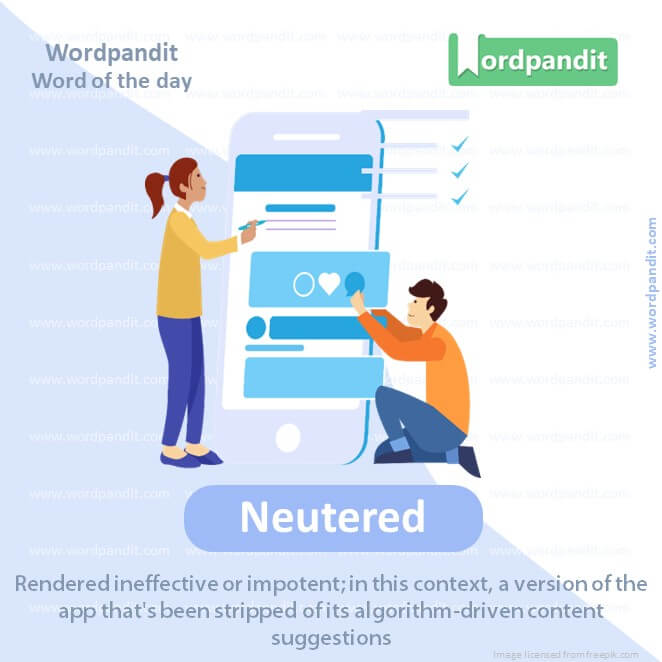
WORD-3: NEUTERED
CONTEXT: The regulatory authorities have been accused of being ‘neutered’ in their response to illegal market activities, doing too little to counteract the issue.
SOURCE: Hindustan Times
EXPLANATORY PARAGRAPH: Neutered is when a pet is operated by a vet so it can’t have babies. It’s done so there won’t be too many unwanted animals in the world.
MEANING: Rendered ineffective or impotent; in this context, a version of the app that’s been stripped of its algorithm-driven content suggestions (Verb).
PRONUNCIATION: noo-turd
SYNONYMS: spay, desex, sterilize, fix, alter
USAGE EXAMPLE:
a) The cat was neutered to prevent it from breeding.
b) It is often recommended to have pets neutered at an early age.
c) Many animal shelters make sure pets are neutered before adoption.
d) John had his dog neutered as a part of responsible pet ownership.
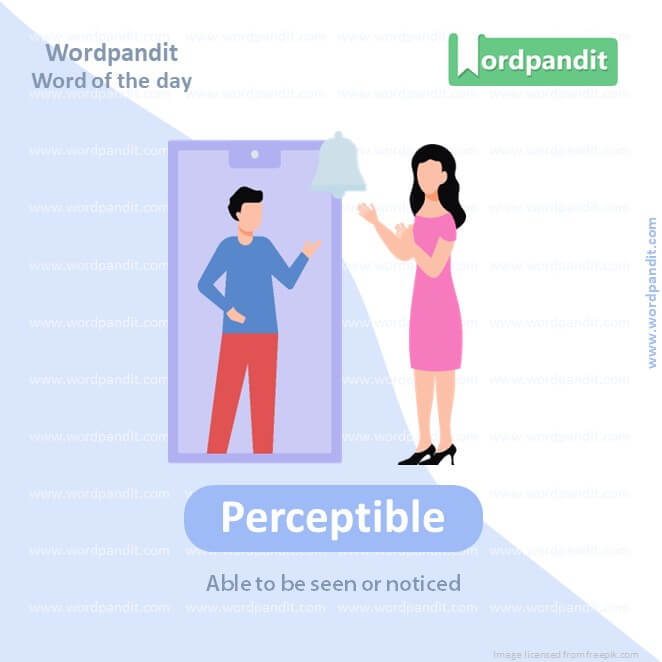
WORD-4: PERCEPTIBLE
CONTEXT: The perceptible increase in the city’s pollution levels have raised concerns among environmentalists, pushing for immediate action from the administration.
SOURCE: Mint
EXPLANATORY PARAGRAPH: Perceptible is something that you can notice using your senses. Like you can see that the milk has turned red or you can smell the pizza baking in the kitchen.
MEANING: Able to be seen or noticed (Adjective).
PRONUNCIATION: per-sep-ti-bul
SYNONYMS: noticeable, detectable, discernible, observable, visible
USAGE EXAMPLE:
a) There’s a perceptible change in the room’s temperature.
b) Her happiness was perceptible to everyone at the party.
c) The progress he’s made in class is perceptible, he is doing much better.
d) There’s a perceptible smell of cooked food in the air.
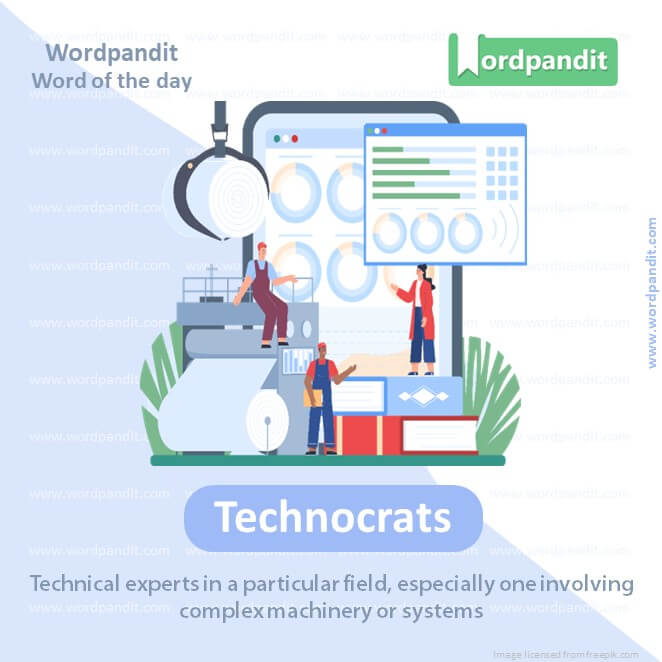
WORD-5: TECHNOCRATS
CONTEXT: The Prime minister’s new vision of governance leans towards technocrats being tasked with policy making roles, arguing that their expertise would make for more efficient execution of projects.
SOURCE: Indian Express
EXPLANATORY PARAGRAPH: Technocrats are like the science experts who know everything about machines, computers, and technology and help us fix our toys or install a new game.
MEANING: Technical experts in a particular field, especially one involving complex machinery or systems (Noun).
PRONUNCIATION: tek-no-krats
SYNONYMS: expert, specialist, boffin, wonk, techie
USAGE EXAMPLE:
a) The company hired technocrats to streamline their IT processes.
b) We need more technocrats in government to understand complex technological issues.
c) Her skills as a technocrat made her a valuable asset to the team.
d) The start-up was full of technocrats with innovative ideas.
WORD-6: UNFETTERED
CONTEXT: In an op-ed, the author criticized the unfettered expansion of some corporations, pointing out the dangers of monopolistic tendencies.
SOURCE: The Economic Times
EXPLANATORY PARAGRAPH: Unfettered is like playing freely in the park without anyone telling you what you can and cannot do.
MEANING: Not restrained or confined by any sort of restriction (Adjective).
PRONUNCIATION: un-fet-erd
SYNONYMS: uncontrolled, unrestricted, unrestrained, unbound, unlimited
USAGE EXAMPLE:
a) She enjoyed the unfettered freedom of university life.
b) This trip offered him an unfettered opportunity to bond with nature.
c) With his parents out, he had an unfettered access to the house.
d) The artist enjoyed unfettered creative freedom.
WORD-7: DISTORTED
CONTEXT: Media’s representation of the issue was criticised for being ‘distorted’, with activists suggesting that it was promoting a biased agenda.
SOURCE: The Times of India
EXPLANATORY PARAGRAPH: If you look at yourself in a funny curved mirror at the fair, your reflection may look long and skinny or short and fat, your reflection has been distorted.
MEANING: To twist out of the true meaning or proportion; to alter to
give a false or unnatural picture or idea (Verb).
PRONUNCIATION: dis-tort-ed
SYNONYMS: warped, twisted, misshaped, altered, skewed
USAGE EXAMPLE:
a) This glass distorts the light passing through it.
b) His report greatly distorted the facts of the case.
c) The newspaper was accused of distorting the truth.
d) The distorted image in the water caused by the ripples was fascinating.
WORD-8: SUPPRESS
CONTEXT: The authorities were accused of trying to suppress peaceful protests by introducing curfews and increasing police presence.
SOURCE: Hindustan Times
EXPLANATORY PARAGRAPH: If your mummy tells you not to jump on her bed and you really, really want to, but you don’t because of mummy, that’s because you have suppressed your desire to jump.
MEANING: To put an end to something such as a feeling, thought, or action, usually by using force or authority (Verb).
PRONUNCIATION: suh-press
SYNONYMS: restrain, quell, subdue, curb, squelch
USAGE EXAMPLE:
a) He is trying to suppress his laughter.
b) The government used the army to suppress the revolution.
c) As a child he learned to suppress his anger.
d) The new drug was found to suppress the cancer cells.
WORD-9: PELLETING
CONTEXT: In a controversial move, the local law enforcement agency resorted to ‘pelleting’ as a means to maintain order during the city-wide protests.
SOURCE: [Not Specified]
EXPLANATORY PARAGRAPH: Pelleting is when we take something soft and squishy and turn it into little balls that are easy to hold and to use. Like when we roll playdough into little balls.
MEANING: The process of creating small, round pieces of substance, usually for use as fuel or feeds (Verb)
PRONUNCIATION: pel-it-ing
SYNONYMS: spheroidizing, globulation, beading, agglomeration, compounding
USAGE EXAMPLE:
a) Pelleting the manure makes it easier to spread.
b) The pelleting process increased the density of the product.
c) His job is pelleting the iron ore for easier transport.
d) The company has invested in a new pelleting machine.
WORD-10: SELF-ORDAINED
CONTEXT: The self-ordained guru’s following saw a sharp increase after reports of his so-called miracles started circulating.
SOURCE: Mint
EXPLANATORY PARAGRAPH: If you start calling yourself a superhero just because you want people to think you have superpowers, you would be self-ordained. You didn’t actually get any superpowers, you just want people to believe you did.
MEANING: To declare or designate (oneself) to a position or status, especially without proper authorization or qualifications (Adjective)
PRONUNCIATION: self-or-daned
SYNONYMS: self-appointed, self-authorized, self-designated, self-proclaimed, self-declared
USAGE EXAMPLE:
a) The man’s self-ordained mission was to clean up his city.
b) She had a self-ordained duty to protect her little brother.
c) The group was led by a self-ordained spiritual guru.
d) His self-ordained status as an expert was widely disputed.
Vocabulary Words
When delving into the dynamic world of languages, the grandeur of ‘vocabulary words’ is all-encompassing. The importance of ‘vocabulary words’ in effective communication cannot be overstated; it’s these words that form the backdrop of any language, painting intricate pictures of thoughts and ideas.
Starting on the journey of learning ‘vocabulary words’, one should steer clear from rote memorization. The traditional structure of merely repeating words lacks the necessary context and application that actually embeds these words into your memory. To truly master the ‘vocabulary words’, one needs an integrated, immersive approach.
The first step towards mastering ‘vocabulary words’ is to engage with varied language mediums. Expanding beyond textbooks to read fiction, articles, blogs, and other forms of content not only diversifies your vocabulary but also acts as a mirror to reflect the practical application of these words. Essentially, you’re exposed to the words as they are commonly used, allowing you to truly understand their essence.
Empowering this journey, tech tools like language learning apps and memory-enhancing flashcards significantly aid in learning ‘vocabulary words’. These interactive tools provide a more engaging learning experience and hone word retention. Mnemonic devices, associating words with a unique story or visual image, enrich the process and make memory recall more efficient.
Practicing ‘vocabulary words’ by using them in day-to-day conversations exemplifies learning by doing. It also strengthens the neural pathways and improves overall word recall. This, coupled with regular revisions, ensures your grasp over ‘vocabulary words’ remains strong.
In conclusion, learning ‘vocabulary words’ is not just about adding words to your linguistic cupboard, but understanding their essence and utilizing them effectively. An inclusive approach to learning that combines diverse reading materials, technology tools, mnemonic devices and practice can really propel your mastery over ‘vocabulary words’. Remember, language is the bloodline of communication, and ‘vocabulary words’ are its heartbeat. ‘













